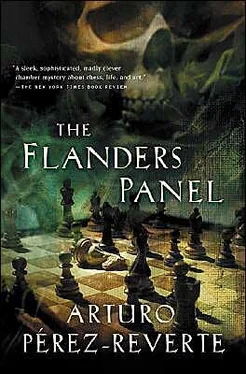From the chapel comes a chorus of voices, the sound muffled by the thickness of the walls, voices singing the praises of God before going to the refectory. The woman dressed in mourning has permission not to attend certain services and at that hour they allow her to walk alone, like a dark, silent shadow, in the deserted cloister. A long rosary of dark wooden beads hangs from her belt, a rosary she has not touched for some time. The distant religious singing becomes confused with the whistling of the wind.
When she starts walking again and reaches the window, the dying sun is just a bright smudge of red in the distance, beneath leaden clouds coming from the north. At the foot of the hill there is a broad grey lake that glitters like steel. The woman rests her thin, bony hands on the ledge of a lancet window – again, as on every evening, her memories pitilessly return – and she feels how the cold from the stone rises up her arms and approaches, slowly, dangerously, her worn-out heart. She is seized by a terrible fit of coughing that shakes her fragile body undermined by the damp of so many winters, tortured by seclusion, solitude and intermittent memories. She no longer hears the songs from the chapel or the sound of the wind. Now it is the sad, monotonous music of a mandolin that emerges from the mists of time, and the harsh autumnal horizon vanishes before her eyes to form, as if in a painting, another landscape: a gentle undulating plain and in the distance, silhouetted against the blue sky as if painted by a fine brush, the slender outline of a belfry. And suddenly she seems to hear the voices of two men sitting at a table, the echo of laughter. And she thinks that if she turns round, she will see herself sitting on a stool with a book in her lap, and that when she looks up, she will see the gleam of a steel gorget and an insigne representing the Golden Fleece. And an old man with a grey beard will smile at her while, brush in hand, he paints on an oak panel, with the quiet skill of his profession, the eternal image of that scene.
For an instant, the wind rips asunder the covering of clouds, and a final gleam of light, reverberating across the waters of the lake, illuminates the woman’s ageing face, dazzles her eyes, which are clear and cold and almost lifeless. Then, as the light dies, the wind seems to howl louder still, stirring the black veils that flap about her like the wings of a crow. She feels again that sharp pain gnawing at her, inside, near her heart, a pain that paralyses half her body and that nothing can alleviate. It freezes her limbs, her breath.
The lake is nothing but a dull smudge in the shadows. And the woman dressed in mourning, whom the world knew as Beatrice of Burgundy, knows that the winter advancing from the north will be her last. And she wonders if, in the dark place to which she is heading, there will be enough mercy to erase from her mind the final shreds of memory.
La Navata, April 1990

Arturo Perez-Reverte was born in 1951 in Cartagena. He is a television journalist who has reported on some of the world’s most dangerous troublespots. The Flanders Panel has been a bestseller in Spain and France.













